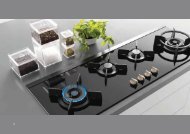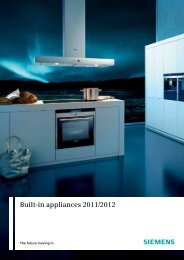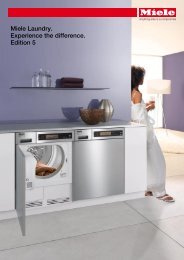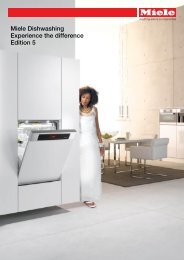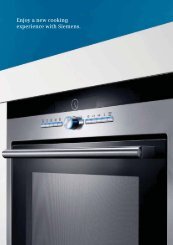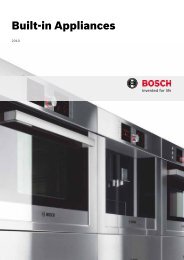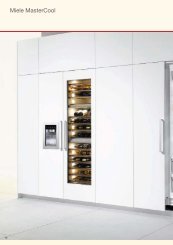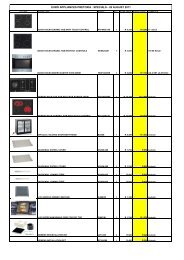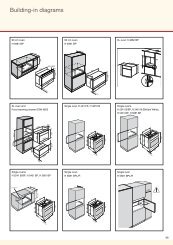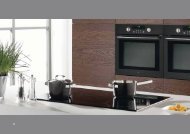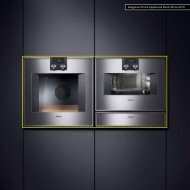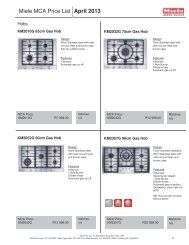Wine, Beverage & Cigars 2012 - Euro Appliances
Wine, Beverage & Cigars 2012 - Euro Appliances
Wine, Beverage & Cigars 2012 - Euro Appliances
Create successful ePaper yourself
Turn your PDF publications into a flip-book with our unique Google optimized e-Paper software.
The ideal storage<br />
temperature for wine<br />
Optimum<br />
air quality<br />
___ The ideal storage temperature for wine is between + 10 °C and + 12 °C. It is critical that the temperature is kept<br />
as constant as possible because this is the only way that a wine’s natural harmony will be preserved. ___<br />
___ The quality of the ambient air is essential if the wine is to develop fully and be enhanced<br />
during storage – any airborne contaminants can be transferred to the wine and spoil it. ___<br />
As the temperature rises, the wine’s molecular kinetic<br />
energy increases and this accelerates the aging<br />
process causing the wine to deteriorate. Consequently,<br />
storage temperatures of between +10°C and +12°C are<br />
recommended for storing wine over prolonged periods.<br />
Maintaining a constant temperature is most important, as<br />
fluctuations during storage will impair the quality of the wine.<br />
Furthermore, the temperature at which a wine is consumed<br />
also plays a crucial role in how it tastes. Red wines should<br />
be served at a warmer temperature than white wines<br />
because they contain more tannins (polyphenols). Tannins<br />
react with oxygen more quickly at higher temperatures.<br />
This is what happens in the process of allowing a wine to<br />
“breathe”, when the full aroma and taste are only achieved<br />
once the wine has combined with oxygen. The length of<br />
time for which a wine should breathe depends on its variety<br />
and quality. Barolo, Rioja, Burgundy and Bordeaux each<br />
take a different amount of time to develop. In general, the<br />
longer a wine matured in the barrel, the more likely it is to<br />
need a longer breathing time for full enjoyment.<br />
Classic natural corks very adequately keep the wine in<br />
the bottle, but in no way do they hermetically seal it.<br />
As a result, air, which is far more than odourless oxygen,<br />
infiltrates the bottle passing down the edges of the cork. If<br />
the bottles are stored in a cardboard box, the wine can take<br />
on the odour of the cardboard. But food odours in particular<br />
present problems. When storing wine at home, especially<br />
in a kitchen environment, wines will almost certainly lose<br />
their »terroir and type« characteristics – i.e. they will spoil!<br />
Although glass stoppers and screw caps provide airtight<br />
closures for bottles, wines inevitably age more slowly<br />
because only the oxygen in the bottle is available to them.<br />
Synthetic corks allow too much air into the bottle, making<br />
them much less suitable for long-term storage of wine<br />
altogether.<br />
4 5



